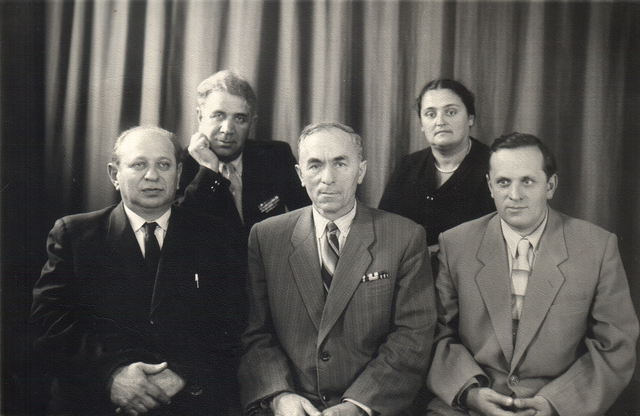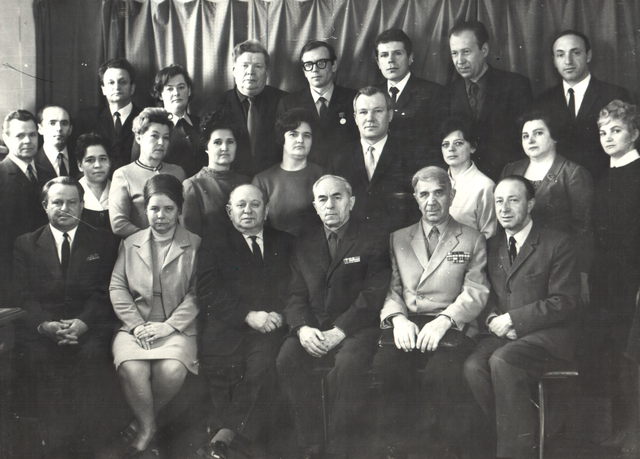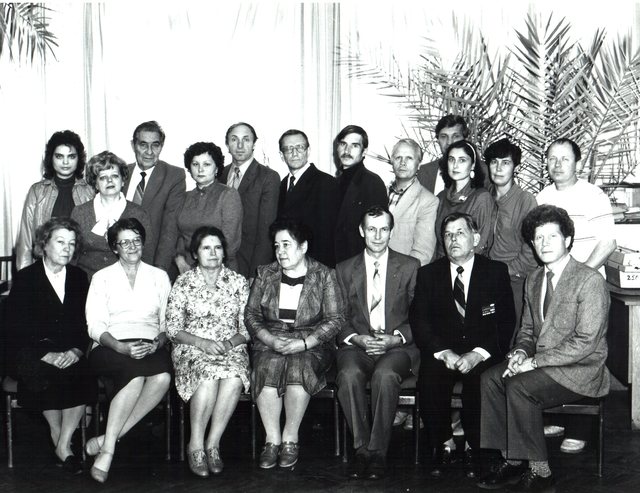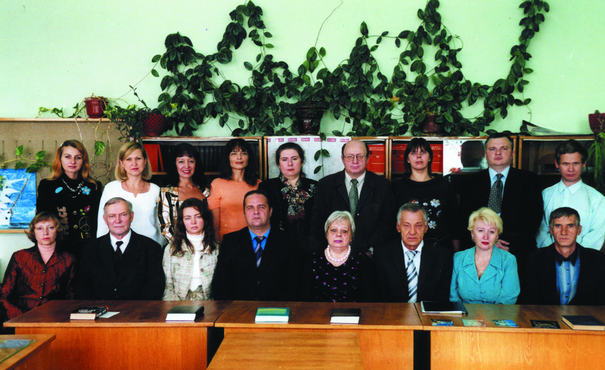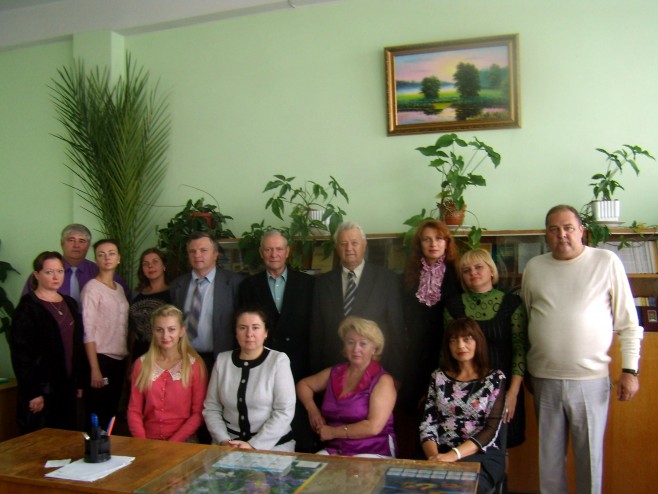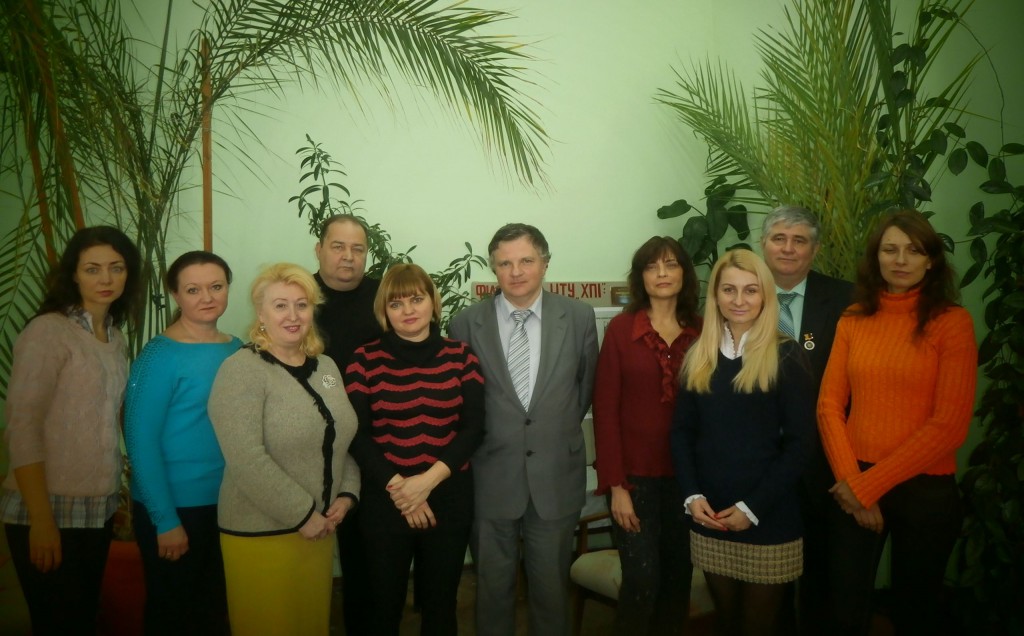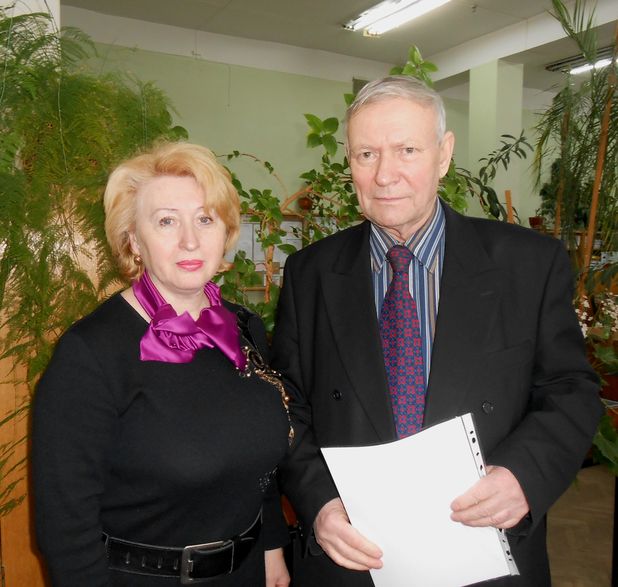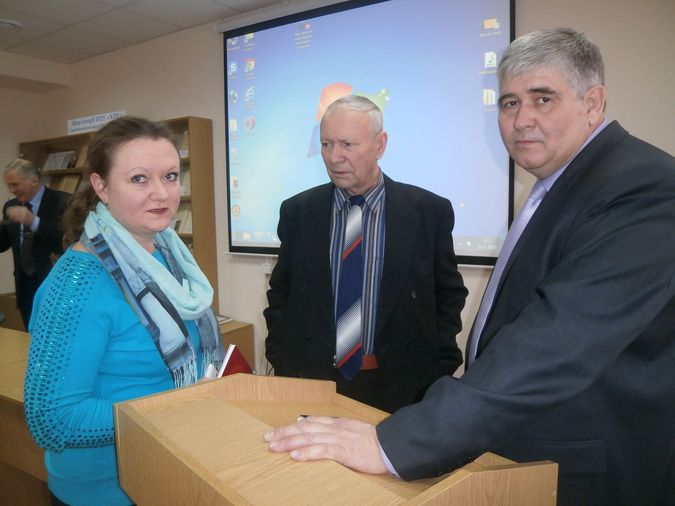The Department of Philosophy was established on April 29, 1957, during a difficult post-war period, when it not only addressed its main task – the development of intellect and the improvement of the thinking style of future leaders of the national economy – but also strengthened the spirit and faith of future specialists in themselves, in their own strengths, and in their ability to overcome and solve the challenges posed by the times.
At that time, the department consisted of seven people: Chornyi I.I. – Associate Professor, Head of the Department; Kravets Y.N. – Associate Professor; Korzh A.I. – Associate Professor; Dobrovolskyi L.H. – Senior Lecturer; Zhelezniakova L.Ya. – Senior Lecturer; Lavinskyi I.S. – Head of the Educational and Methodological Office; and Kohan S.B. – Senior Laboratory Assistant.
From its very beginning, the Department of Philosophy was primarily a general department within the higher education institution. Such a department is always a complex organism, living according to its own laws, because in many issues it is one of the key links in the multi-stage system of a higher education institution when solving the main tasks of student education and upbringing.
Each semester, the department’s lecturers teach at least fifteen hundred students of various specialties, and the main tasks of their study of philosophy remain the skills to ask the right questions, to be able to doubt, to build clear thinking schemes, to formulate unknown problems, and so on. Philosophy does not leave the life of a future specialist after they pass their bachelor’s or master’s exam, because it only records the fact that the student has received a certain minimum of knowledge in the discipline. This knowledge is not lost by the person in the following years; it gives “shoots” in their worldview, correcting, developing, and supplementing it. It is no coincidence that many students, even after graduation, maintain ties with the department and their teachers: they participate in conferences and seminars, come for help in solving complex issues, and share their life experiences and achievements. Some continue their studies as postgraduate students or external candidates, and they return to their teachers to deepen their knowledge of philosophy for further activity in the scientific field.
The Department of Philosophy not only teaches students the basics of philosophy. Throughout its long history, the department’s lecturers have taught philosophy to undergraduate students, master’s students, postgraduate students, and external candidates, and have taught logic courses to students of all specialties. At one time, the department initiated the teaching of a general course on the history of science and technology, the program of which was developed by Associate Professor Shchedrin A.T. This course was first taught to students of four faculties in the 1991-1992 academic year. Since 1999, the department’s lecturers began teaching courses in philosophy and logic to students of all specialties in the заочне (part-time/correspondence) department, and from the 2005-2006 academic year – a special course on philosophical problems of ecology (Associate Professor Hodz N.B.). In the same year, Associate Professor Husiev S.O. developed educational and methodological complexes for the implementation of distance learning for students in the courses “Philosophy” and “Logic.” Since 2007, the Department of Philosophy began teaching philosophy and logic in English: Associate Professor Horodyska O.M. developed a philosophy course for students with in-depth study of English. In addition to teaching students, the Department of Philosophy, fulfilling its functions as a general department and the task of training highly qualified specialists, always held classes with postgraduate students, and later – with master’s students of the university. Annually, master’s students attended the course “Special Issues of Philosophy,” which later changed to “Philosophical Problems of Modern Scientific Cognition.” Postgraduate students who took the mandatory candidate’s exam in philosophy studied philosophy for a year: they attended lectures and seminars, and prepared a mandatory abstract. This not only allowed for a broader and more fundamental preparation of postgraduate students for the exam but also laid a deep scientific and methodological foundation for their future activities as scientists. Over the years, the department has prepared more than 7,000 postgraduate students and external candidates for the exam. Among them were future heads of enterprises, heads of departments, deans of faculties, vice-rectors, and rectors of higher education institutions in various countries, prominent scientists, and statesmen.
Many years of teaching work have led to fruitful methodological work by the department. In the 1980s, the department initiated the improvement of methodological work at the institute as a whole by creating philosophical (methodological) seminars, developing cooperation between the Department of Philosophy and other specialized and natural science departments, and through the creation of pairs of cooperation between philosophy teachers and representatives of other departments of KhPI. In 1967, methodological seminars on philosophical issues of natural science were established at the polytechnic institute. The first such seminars were led by Professor Kravets Y.N. and Associate Professor Yushko A.F. Based on this seminar, a conference “Dialectics and Logic of Modern Scientific Cognition” was held at KhPI. In 1975, the number of such seminars increased to 16. Along with methodological seminars, theoretical seminars on philosophy were also organized. The leadership of such seminars was carried out by all teachers of the department. In 1967, 32 theoretical seminars operated at KhPI, 13 of which were on philosophy. Professor Yermolovskyi M.A. was the organizer of the inter-university branch of scientific workers, teachers, and heads of philosophical problem-solving and methodological seminars at KhPI. He was also one of the initiators of the creation of the Institute of Social Sciences at KhPI, formed and headed an inter-university scientific group of philosophers for the development of methodological and worldview problems of natural and technical sciences, which significantly influenced the development of the Kharkiv school of philosophy of science and technology. Associate Professor Hrytsenko V.P. for many years conducted classes of the methodological seminar for teachers of the departments of theoretical mechanics and technical mechanics. On the initiative of Professor Trebin M.P., the updating of the program and curricula began in connection with the transition to teaching philosophy and logic according to the Bologna system. Currently, the Department of Philosophy annually holds: the international scientific and practical conference “Philosophy in the Modern World,” aimed at highlighting current philosophical problems of modern society and the development of the philosophy of science and technology, legal and socio-cultural issues of the Ukrainian 1 state, and issues of the nation’s spiritual and physical health; the international scientific and methodological seminar “Human / World at a Crossroads: Technologies, Resources, Social Institutions,” aimed at discussing possible trajectories of the modern world’s development from a philosophical perspective. The department constantly updates the methodological support of the educational process and is very sensitive to changes taking place in the world as a whole and in the teaching of philosophy in particular.
The Department of Philosophy was established on April 29, 1957, during a difficult post-war period, when it not only addressed its main task – the development of intellect and the improvement of the thinking style of future leaders of the national economy – but also strengthened the spirit and faith of future specialists in themselves, in their own strengths, and in their ability to overcome and solve the challenges posed by the times.
At that time, the department consisted of seven people: Chornyi I.I. – Associate Professor, Head of the Department; Kravets Y.N. – Associate Professor; Korzh A.I. – Associate Professor; Dobrovolskyi L.H. – Senior Lecturer; Zhelezniakova L.Ya. – Senior Lecturer; Lavinskyi I.S. – Head of the Educational and Methodological Office; and Kohan S.B. – Senior Laboratory Assistant.
From its very beginning, the Department of Philosophy was primarily a general department within the higher education institution. Such a department is always a complex organism, living according to its own laws, because in many issues it is one of the key links in the multi-stage system of a higher education institution when solving the main tasks of student education and upbringing.
Each semester, the department’s lecturers teach at least fifteen hundred students of various specialties, and the main tasks of their study of philosophy remain the skills to ask the right questions, to be able to doubt, to build clear thinking schemes, to formulate unknown problems, and so on. Philosophy does not leave the life of a future specialist after they pass their bachelor’s or master’s exam, because it only records the fact that the student has received a certain minimum of knowledge in the discipline. This knowledge is not lost by the person in the following years; it gives “shoots” in their worldview, correcting, developing, and supplementing it. It is no coincidence that many students, even after graduation, maintain ties with the department and their teachers: they participate in conferences and seminars, come for help in solving complex issues, and share their life experiences and achievements. Some continue their studies as postgraduate students or external candidates, and they return to their teachers to deepen their knowledge of philosophy for further activity in the scientific field.
The Department of Philosophy not only teaches students the basics of philosophy. Throughout its long history, the department’s lecturers have taught philosophy to undergraduate students, master’s students, postgraduate students, and external candidates, and have taught logic courses to students of all specialties. At one time, the department initiated the teaching of a general course on the history of science and technology, the program of which was developed by Associate Professor Shchedrin A.T. This course was first taught to students of four faculties in the 1991-1992 academic year. Since 1999, the department’s lecturers began teaching courses in philosophy and logic to students of all specialties in the заочне (part-time/correspondence) department, and from the 2005-2006 academic year – a special course on philosophical problems of ecology (Associate Professor Hodz N.B.). In the same year, Associate Professor Husiev S.O. developed educational and methodological complexes for the implementation of distance learning for students in the courses “Philosophy” and “Logic.” Since 2007, the Department of Philosophy began teaching philosophy and logic in English: Associate Professor Horodyska O.M. developed a philosophy course for students with in-depth study of English. In addition to teaching students, the Department of Philosophy, fulfilling its functions as a general department and the task of training highly qualified specialists, always held classes with postgraduate students, and later – with master’s students of the university. Annually, master’s students attended the course “Special Issues of Philosophy,” which later changed to “Philosophical Problems of Modern Scientific Cognition.” Postgraduate students who took the mandatory candidate’s exam in philosophy studied philosophy for a year: they attended lectures and seminars, and prepared a mandatory abstract. This not only allowed for a broader and more fundamental preparation of postgraduate students for the exam but also laid a deep scientific and methodological foundation for their future activities as scientists. Over the years, the department has prepared more than 7,000 postgraduate students and external candidates for the exam. Among them were future heads of enterprises, heads of departments, deans of faculties, vice-rectors, and rectors of higher education institutions in various countries, prominent scientists, and statesmen.
Many years of teaching work have led to fruitful methodological work by the department. In the 1980s, the department initiated the improvement of methodological work at the institute as a whole by creating philosophical (methodological) seminars, developing cooperation between the Department of Philosophy and other specialized and natural science departments, and through the creation of pairs of cooperation between philosophy teachers and representatives of other departments of KhPI. In 1967, methodological seminars on philosophical issues of natural science were established at the polytechnic institute. The first such seminars were led by Professor Kravets Y.N. and Associate Professor Yushko A.F. Based on this seminar, a conference “Dialectics and Logic of Modern Scientific Cognition” was held at KhPI. In 1975, the number of such seminars increased to 16. Along with methodological seminars, theoretical seminars on philosophy were also organized. The leadership of such seminars was carried out by all teachers of the department. In 1967, 32 theoretical seminars operated at KhPI, 13 of which were on philosophy. Professor Yermolovskyi M.A. was the organizer of the inter-university branch of scientific workers, teachers, and heads of philosophical problem-solving and methodological seminars at KhPI. He was also one of the initiators of the creation of the Institute of Social Sciences at KhPI, formed and headed an inter-university scientific group of philosophers for the development of methodological and worldview problems of natural and technical sciences, which significantly influenced the development of the Kharkiv school of philosophy of science and technology. Associate Professor Hrytsenko V.P. for many years conducted classes of the methodological seminar for teachers of the departments of theoretical mechanics and technical mechanics. On the initiative of Professor Trebin M.P., the updating of the program and curricula began in connection with the transition to teaching philosophy and logic according to the Bologna system. Currently, the Department of Philosophy annually holds: the international scientific and practical conference “Philosophy in the Modern World,” aimed at highlighting current philosophical problems of modern society and the development of the philosophy of science and technology, legal and socio-cultural issues of the Ukrainian 1 state, and issues of the nation’s spiritual and physical health; the international scientific and methodological seminar “Human / World at a Crossroads: Technologies, Resources, Social Institutions,” aimed at discussing possible trajectories of the modern world’s development from a philosophical perspective. The department constantly updates the methodological support of the educational process and is very sensitive to changes taking place in the world as a whole and in the teaching of philosophy in particular.
The Bulletin of NTU “KhPI,” thematic issue “Philosophy,” was founded in 1996, and after 1999, it was registered with the Higher Attestation Commission of Ukraine and included in the list of specialized publications. From the beginning, the Bulletin offered a wide range of problems for publication: current philosophical, methodological, and worldview aspects, trends in the development of science, technology, anthropology, cultural studies, education, etc. After changes in the requirements for maintaining the status of a specialized publication, the Bulletin ceased to exist directly at the Department of Philosophy, but the department’s staff actively joined the Bulletin of NTU “KhPI,” series “Actual Problems of the Development of Ukrainian Society,” which is published within the ESSHT. This collection was included in category “B” in philosophy of the “List of Scientific Professional Publications of Ukraine.” The journal highlights the problems of the development of modern Ukrainian society, in particular philosophical, social, psychological, and linguistic problems, as well as problems of national development, economic and technical formation of the state system, and the formation of civil society. Among the members of the editorial board of the Bulletin are professors of the Department of Philosophy: Vladenova I. V., Dolska O. O., and Tararoiev Ya. V.
In 1966, postgraduate studies were opened at the Department of Philosophy, headed by Kravets Y.N. and Chornyi I.I. Postgraduate studies at the department operated until 1975, during which time 7 candidates of sciences were trained, of whom Yermolovskyi M.A. subsequently headed the department for more than 18 years, and Kurochkina M.S. became the first female professor in the department. After a sufficient number of doctors of philosophical sciences appeared at the department (4 doctors of philosophical sciences – Tararoiev Ya.V., Dolska O.O., Hodz N.B., Vladenova I.V., who became scientific supervisors of postgraduate students), postgraduate studies in the specialty “033-Philosophy” were reopened in 2016, and it continues to operate to this day. At this stage of the existence of postgraduate studies at the Department of Philosophy, 4 successful defenses of dissertations for the degree of Doctor of Philosophy in the specialty “033-Philosophy” were held. All graduates of the department fruitfully work in their chosen specialty in various higher education institutions in Ukraine and abroad.
The scientific activity of the Department of Philosophy is aimed at conducting scientific research, the participation of the department’s teachers in domestic and international scientific conferences and seminars, the training of highly qualified scientists, the involvement of university students in research activities, and the preparation of monographs. The teachers of the Department of Philosophy are constantly engaged in the development of a specific research topic, which is approved by a state body.
A special place is occupied by the existence of bilateral agreements with the Lithuanian Sports University (Lithuania), Vytautas Magnus University (Lithuania), and Marijampolė College (Lithuania), which provide for the possibility of international internships, as well as the exchange of postgraduate students. In particular, from April 1, 2024, by order of NTU “KhPI” № 619 ST dated March 26, 2024, Jolita Vveinhardt, Doctor of Social Sciences, Professor, Chief Researcher of the Transdisciplinary Institute of Social and Humanistic Research of Vytautas Kavolis at Vytautas Magnus University (Lithuania), was appointed as the second scientific supervisor for the department’s postgraduate students, which is the basis for further fruitful cooperation.
The department, even in our difficult times, is focused on the individual, their problems and hopes, fostering spiritual resilience, openness to the world, positive thinking, and a thirst for knowledge. The strategic direction of the department is the study of philosophical problems in science, technology, and education.
Currently, the department employs 10 teachers, including 4 doctors of philosophical sciences and 2 professors.

